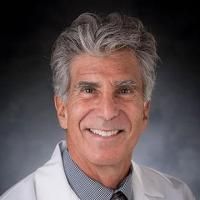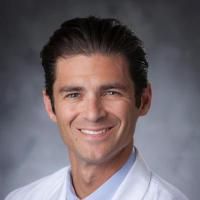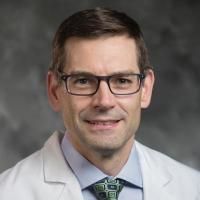Neurological Sequelae and Clinical Outcomes After Lung Transplantation.
Date
2018-04
Journal Title
Journal ISSN
Volume Title
Repository Usage Stats
views
downloads
Citation Stats
Attention Stats
Abstract
Neurological complications are common after lung transplantation. However, no large cohort studies have examined the incidence, predictors, and clinical significance of neurological events sustained by lung transplant recipients.We conducted a retrospective cohort analysis of a consecutive series of lung transplant recipients, transplanted at Duke University Medical Center between May 2014 and February 2017 (n = 276). Early neurological complications (ie, occurring during the first week after transplant) were documented by transplant mental health specialists and included delirium, ischemic injury, and posterior reversible encephalopathy syndrome. Analyses accounted for age, native disease, sex, type of transplant, lung allocation score, and primary graft dysfunction. The objectives of the study were to characterize the prevalence and predictors of early neurological sequelae (NSE), occurring during the first week posttransplant, and the association between NSE and subsequent clinical outcomes, including length of stay and mortality.Neurological sequelae were common, occurring in 123 (45%) patients. Fifty-seven patients died over a follow-up interval of 2.1 years. The most common NSE were postoperative delirium (n = 110 [40%]) and posterior reversible encephalopathy syndrome (n = 12 [4%]), followed by stroke/transient ischemic attack and neurotoxicity. Higher lung allocation score was the strongest predictor of delirium. The presence of a NSE was associated with longer length of hospital stay (32 days vs 17 days, P < 0.001) and greater mortality (hazard ratio, 1.90; 95% confidence interval, 1.09-3.32], P = 0.024), with the greatest mortality risk occurring approximately 2 years after transplantation.Neurological events are relatively common after lung transplantation and associated with adverse clinical outcomes.
Type
Department
Description
Provenance
Subjects
Citation
Permalink
Published Version (Please cite this version)
Publication Info
Smith, Patrick J, Gregory L Stonerock, Krista K Ingle, Caroline K Saulino, Benson Hoffman, Brian Wasserman, James A Blumenthal, Scott M Palmer, et al. (2018). Neurological Sequelae and Clinical Outcomes After Lung Transplantation. Transplantation direct, 4(4). p. e353. 10.1097/TXD.0000000000000766 Retrieved from https://hdl.handle.net/10161/17621.
This is constructed from limited available data and may be imprecise. To cite this article, please review & use the official citation provided by the journal.
Collections
Scholars@Duke

Gregory Lee Stonerock
Dr. Stonerock is interested in coping strategies and psychosocial interventions among individuals with chronic illnesses, especially solid organ transplant recipients and candidates. His previous work includes research on coping strategies for chronic and acute pain, sickle cell disease, and the interrelation between sleep and pain processing. Current research interests include identifying psychosocial predictors of good medical outcomes and quality of life for patients after transplantation.

Benson Mark Hoffman
I have a longstanding interest in the effects of cardiopulmonary disease on health-related quality of life, including depression, cognition, and sexual function. I also study the effects of coping, aerobic exercise, and lung transplantation on quality of life.

James Alan Blumenthal
Psychosocial factors and coronary heart disease, including such factors as social support, Type A behavior and hostility, and depression, exercise training and depression in the elderly; behavioral approaches to the treatment of hypertension (e.g., weight loss and exercise); cardiac rehabilitation; neuropsychological outcomes following cardiac surgery; psychosocial aspects of heart and lung transplantation; exercise training and osteoarthritis and fibromyalgia; compliance.

Scott Michael Palmer
Dr. Palmer is physician investigator, clinician, and academic leader. He is a Donald F. Fortin, MD Distinguished Professor of Medicine at Duke University, Vice Chair for Research in the Department of Medicine, Director of Medicine Plus Therapeutic Area at the Duke Clinical Research Institute, and Director of Clinical Research in the Duke Transplant Center. He is an expert in the care of patients with advanced lung diseases and lung transplantation.
Dr. Palmer’s successful research career includes over 20 years of continuous NIH funding and over 300 publications. He has held key leadership roles in national and international pulmonary and transplant societies, has chaired many sessions at national and international meetings, served on the editorial board for prominent journals, and serves regularly on NIH study sections. He has received numerous honors including election into Alpha Omega Alpha (AOA) and the American Society for Clinical Investigation (ASCI). During his career, he has led numerous multicenter clinical trials, data coordinating centers, and observational networks in lung transplant, pulmonary fibrosis, and other lung diseases.
His research has transformed current clinical practices in lung transplant, including prevention of infections such as cytomegalovirus (CMV) and management of chronic lung allograft dysfunction (CLAD). His work in idiopathic pulmonary fibrosis (IPF) has advanced novel clinical treatments, discovered prognostic biomarkers, and identified disease genetic risks. Dr. Palmer’s clinical research also includes studies of patient centered outcomes and analysis of real-world data across different lung diseases. Dr. Palmer’s translational research includes studies of lung innate immunity, airway cell biology and human immunology. His recent translational studies use single cell and spatial transcriptomic approaches to discover novel lung disease mechanisms.
Dr. Palmer is a dedicated mentor to trainees and junior faculty, having personally mentored over 40 pre- and post-doctoral trainees, many of whom are now engaged in their own successful research careers. He also co-leads multiple institutional training programs including two R38 awards supporting dedicated resident research and a T32 training program in pulmonary medicine, reflecting his deep commitment to training the next generation of academic investigators.

Jacob A Klapper

Matthew Hartwig
Dr. Hartwig is a thoracic surgeon with a clinical focus in lung transplantation and robotic assisted minimally invasive thoracic surgery for the treatment of diseases of the chest. He serves as the Surgical Director of the Duke Lung Transplant Program and the Esophageal Center at Duke. Additionally, he directs the Surgical Office of Clinical Research, which manages the clinical research portfolio for the Department of Surgery. He also leads a successful program of clinical, basic and translational research in thoracic surgery and lung transplantation. He currently directs the Duke Ex Vivo Organ Laboratory (DEVOL), is the Chief of Lung Transplant Research, and is a faculty member at the Duke Clinical Research Institute (DCRI).
Dr. Hartwig has over 150 peer reviewed publications, received numerous awards, chaired many sessions at national and international meetings, serves regularly on NIH study sections, and is on the editorial board of many prominent journals. He has also personally mentored over pre-and post-doctoral trainees, many of whom are now engaged in their own successful research careers.

Laurie D. Snyder
Advanced lung disease, lung transplantation, interstitial lung disease, immune monitoring
Unless otherwise indicated, scholarly articles published by Duke faculty members are made available here with a CC-BY-NC (Creative Commons Attribution Non-Commercial) license, as enabled by the Duke Open Access Policy. If you wish to use the materials in ways not already permitted under CC-BY-NC, please consult the copyright owner. Other materials are made available here through the author’s grant of a non-exclusive license to make their work openly accessible.
